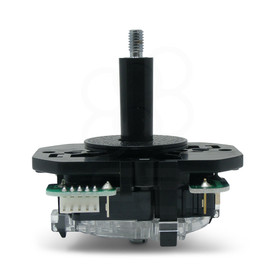- Category
- What's New?
- FightSticks/Pads
- Joysticks
- Pushbuttons
- Spare Parts & Tools
- Hardware & PCB
- Electrical
- Customize
- Merchandise
- Sales & Clearance
- Brand
Sanwa JLX-TPML-8YT-SK Adjustable Silent Leaf Microswitch Joystick
Sorry but this item is currently unavailable.
Please check back at a later stage.
Choose Your Options
-
Product Description

Check out our garage sale! These items are or will be discontinued from the manufacturer, or we are phasing them out from our store to make room for other items. These are priced to move, and do not qualify under our return policy. Any products marked as sold out will not be replenished.
The Sanwa TPML-8YT-SK represents a first in mechanical input tech from the company, with a a five point adjustable setting directly on the microswitch. This allows you to modify the engagement speed to your preference for each direction. The TPML is also a silent operator, using specialized Sanwa MLS-57AU leaf microswitches.
Features
- Five point adjustable setting directly on the microswitch.
- Modify the engagement speed for each direction to your preference.
- MLS-57AU leaf microswitch is mostly silent.
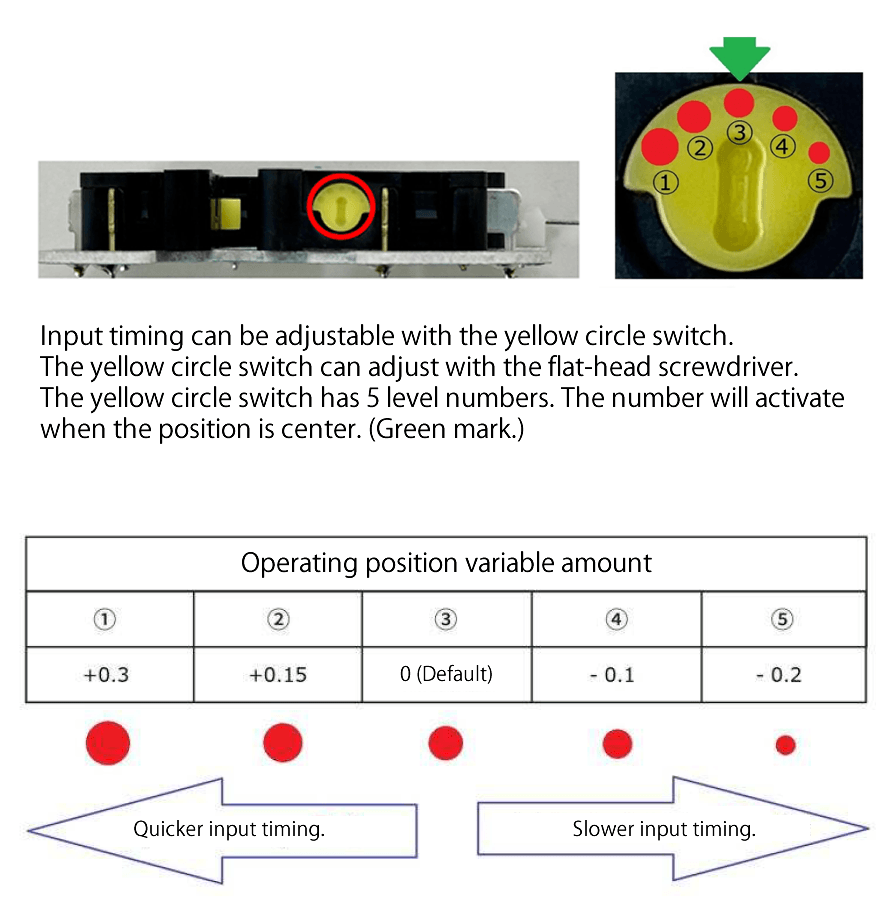
Unmatched Accuracy: New Material Construction, Pivot, Spring Seat Washer, P-W Actuator
The Sanwa JLX has achieved high-precision molding and improved input accuracy by changing the material of the component parts. Please review below some of the technical improvements over the JLF:
- LX-P-2 M base material changed from nylon to POM (polyacetal resin). It is less susceptible to environmental influences such as temperature and humidity.
- By increasing the thickness of the washer for the M base, rattling of the washer during operation is reduced.
- Adjusted the shape inside the M base where the bearing fits. Less rattling of the bearing than before.
- Changed bearing material from POM to nylon. Abrasion resistance and sliding against the M base are enhanced.
- The material of the micro printed circuit board is changed from paper phenol to CEM-3. It is less likely to warp than paper phenol and has improved durability.
The Sanwa JLF P-W Actuator from the brands' JL-C line rounds out the list of improvements in the JLX. The JLF P-W Actuator is 16.2mm wide at the base - just over .4mm wider than the original Sanwa JLF actuator at 15.8mm. This is the same actuator used in the silent JLF-TPRG-8BYT-SK. It has higher dimensional stability in molding than the conventional black actuator and reduces variations in input accuracy. It is also it is about 0.12mm thicker (0.24mm in diameter) than the black actuator, but it was adopted because of its good usability by location tests and e-sports gamers.
Actuator Specs
Below is a visual of available actuators for Sanwa JLF. The original JLF actuator has a 15.8mm diameter. Following this are actuators of increasing diameter. Use this to experiment with your preferred engagement sensitivity.
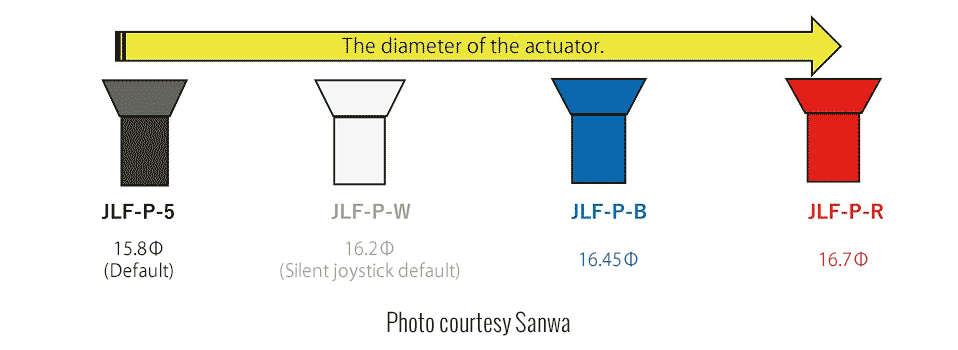
GT-8X Restrictor Plate
Sanwa introduced the GT-8X restrictor plate with its line of JL-C performance mods. This gate is now the default in the JLX. This plate is compatible with the GTN series of lever guide tips/inserts:
- Sanwa GTN-Y Octagonal Restrictor Gate Insert
- Sanwa GTN-VI Round Restrictor Gate Insert
- Sanwa GTN-R Square Mod Type I Restrictor Gate Insert
- Sanwa GTN-B Square Mod Type II Restrictor Gate Insert
Guide Tips
Guide Tips are inserts for the GT-8X Square Restrictor Gate that comes with the Sanwa JLX family. Each guide is color-coded and designed to provide a unique enhancement to lever travel, from the tried-and-true octagonal control of the yellow GTN-Y to the hybrid rounded square of the GTN-B.
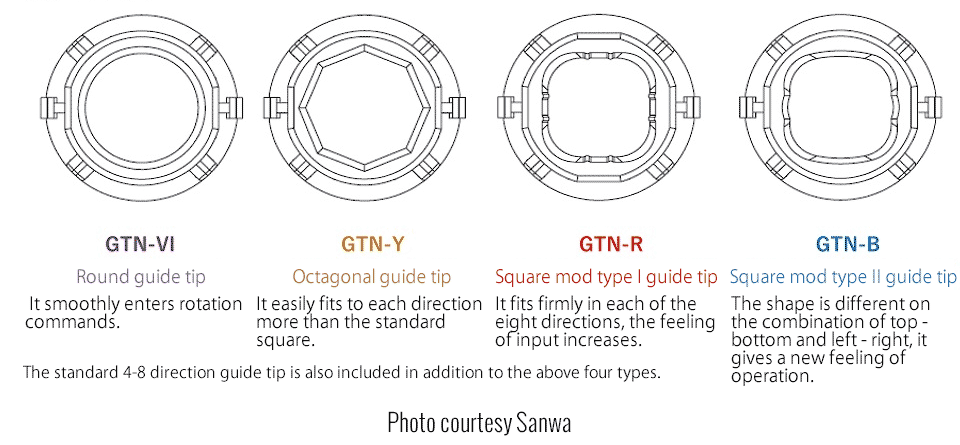
Wide Compatibility with Prior Sanwa accessories
While the JLX is a marked departure from its previous model, many of the accessories, such as balltop and battops that use the M6 threading, still work with Sanwa's newest hardware. This is great news for most players who invested in Sanwa's lever ecosystem. However, guide-tips/inserts that were compatible with the JLF may not work with the GT-8X restrictor plate. Some of the newer accessories and performance mods include:
- Sanwa JLF Violet Spring (1, 1.5 Tension Load)
- Sanwa JLF Yellow Spring (1.3, 2 Tension Load)
- Sanwa JLF Blue Spring (1.5, 1.5 Tension Load)
- Sanwa JLF Red Spring (2, 2 Tension Load)
- Sanwa JLF P-5 Actuator
- Sanwa JLF P-R Actuator
- Sanwa JLF P-B Actuator
The Anatomy of JLX and Compatibility Notes
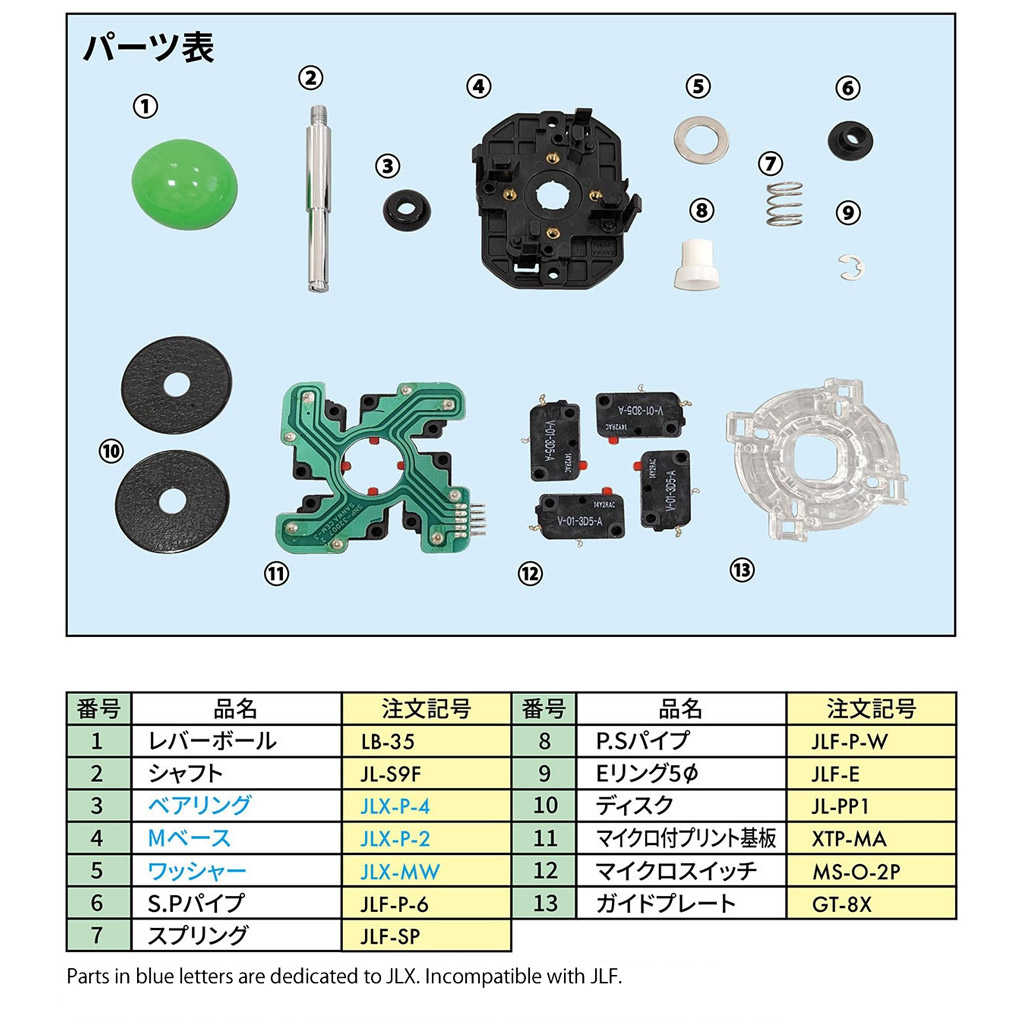
Certain components that comprise the JLX are compatible with the original JLF-TP-8YT. However, some are not. It's important to know this before purchasing individual parts in an attempt to upgrade the JLF. It is recommended that you do not perform this, as the mix of different materials may lead to a degraded experience.
- #1 LB-35 sold separately.
- #3 JLX-P-4: JLX dedicated bearing (Incompatible with JLF-P-4)
- #4 JLX-P-2: M base dedicated to JLX (Incompatible with JLF-P-2)
- #5 JLX-MW: Washer for JLX M base (Incompatible with JLF-MW)
- #11 XTP-MA: Printed circuit board with JLX micro (Compatible with JLF)
- JLF-P-W and GT-8X are compatible with JLF and are already on sale as custom parts for JLF.
-
Product Reviews
-
Awesome lever
Loved the Sanwa lever line since I first tried it and the silent JLX is just as good as expected.
It's pretty much as silent as it can be and the adjustable switches give you a great way to lower engage without lowering the overall throw of the stick.
The sensation and sound profile is closest to the feel of an analog stick you'd find on a gamepad but as a full-size digital lever. Easily my favorite lever I've tried. Unknown on May 26th 2025 -
Silence appreciated Sanwa!
Great silent stick. Upgraded with larger actuator and 2lb spring... Unknown on Oct 22nd 2024
-
If you like the JLF you will like this
Solid stick. Silent as expected. For me best setup was 1/1.5lb(purple) progressive spring black JLF actuator & adjusting switches to max sensitivity. Corners feel larger/more consistent. Able to use a circle gate without issues in this config. If you like the JLF or want a silent stick I highly recommend this product.
Dabenport on Oct 9th 2024 -
Solid
This lever when used in late night sessions keeps from waking up people in other rooms and keeps your opponent guessing at locals Unknown on Sep 1st 2024
-
REALLY Tight Inputs
For context, I have the Sanwa Silent JLF, plenty of standard JLFs, and I've been using the new JLX controllers.
These switches do feel unique in that you never feel a "click" or any type of input register on the internal leaf plates. I am a player who likes immediate feedback, and I was unsure if this would work for me. On the "3" default setting, they did just feel like my Silent JLF and did not really have a unique property to them. But on the "1" setting, the responsive inputs and fast action is making this one of my favorite sticks. I will always like the "click" of the traditional JLX, but this is quickly becoming my favorite non-traditional Sanwa. Lucipher on Aug 21st 2024 -
Microswitches that can be fine tuned
As a base line this uses mostly the same parts as the new JLX, but if you look at the microswitches on the PCB assembly they have SANWA stamped on them instead of Omron. This looks to be custom and I hope they run with this idea. This is definitely for tinkerers and I may switch to it long term, but I think it can be improved further.
I've tried many levers searching for something that feels just right, including a Magenta and a Suzo Inductive. Both of those offered custom tuning, but both of them had problems that left me wanting more. My current lever has zippy microswitches that I took apart and stuffed paper into so I could get the switches to engage faster (gift card trimmings were too thick), and an Otto V5 kit.
I like the notched square restrictor plate that this is compatible with (separate item). This perk alone alone makes me see it as a *possible* upgrade over my current lever if I can tune it just right.
This lever defaults to a very similar sensitivity to the JLF (I haven't tried a stock JLX). I can't imagine someone needing something less sensitive than the stock setting, but you have two whole options for that (-0.1 and -0.2). Meanwhile, going up in sensitivity increases by a larger amount (+0.15 and +0.3). Going up one step isn't quite enough for my taste, but going up two steps is too much. Or it might actually be really nice if I could solve problems that +0.3 creates.
I'm using the 13mm actuator that came with my V5 kit for now because the top is wider and that reduces throw without reducing the dead zone too much. If you use the Sanwa P-R actuator with this JLX at +0.3 you'll engage with the slightest movement. That's neat, but IMO not ideal for fighting games. Even with it set to +0.15 you'll have snap-back issues when you use the P-R or P-B actuator and a higher tension spring wont save you. I'm using a 2lb spring and was disappointed with the performance of those variable tension springs (1.3~2lbs) even though I really liked the idea.
Sanwas actuators only increase in size at the bottom so they don't reduce throw. They increase sensitivity. That's what the adjustable micro switches are for in this stick, so I don't see them as working well together. Maybe one of those Paradise Arcade aluminum actuators is an in-between size that's a better fit than the large one I'm using. I feel like this lever would be perfect with an actuator that's wider at the top for reduced throw but narrow like the old JLF actuator at the bottom to fit with the +0.3 setting.
Unfortunately, even with the wider actuator to reduce throw (also reduces stored tension in the spring) and a constant 2lb spring, I can't use the +0.3 sensitivity option without unwanted inputs occurring on a release. This interferes with 63214656 inputs, as I'll get 6321464 and buffer a backdash. At +0.15 I only have that problem if I'm moving the lever way too hard and fast, so I consider that solved. But my Frankenstein lever is more sensitive than this AND solved that problem...
As far as improving this product, I'm not interested in reduced sensitivity from the default setting. I'd rather have the fidelity of +0.07, +0.14, +0.21 and +0.28 if you can manufacture the switches with those tolerances. Maybe an alternate PCB option is in the cards if this one does well?
They do need to sell this custom PCB assembly stand alone. I wouldn't want to buy a whole lever again when one of the switches goes bad. This item does raise the question of what's less expensive to manufacture, since you can increase sensitivity via the actuator, and since reduced throw pairs nicely with increased sensitivity. Maybe a slightly tighter restrictor plate is a solution that would go well with this product, as that's an easier part to replace than the actuator and could reduce throw... SlashGordon on Aug 8th 2024 -
Silent as described
If you are looking for a stick that is almost completely silent, the only noise being from the restrictor or slap of the stick on the side of the arcade stick housing, this thing will meet your needs.
It takes some getting used to, however, as from my experience I have needed to get used to no longer hearing the click of the switches. SteveL on Jan 8th 2024
-
-
Find Similar Products by Category


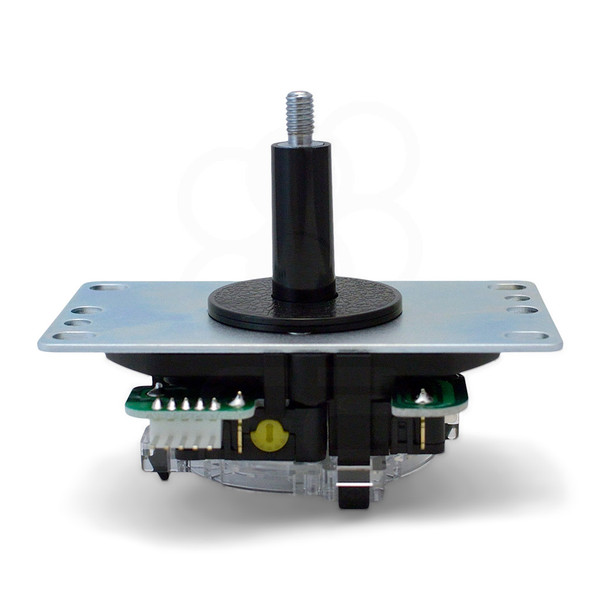

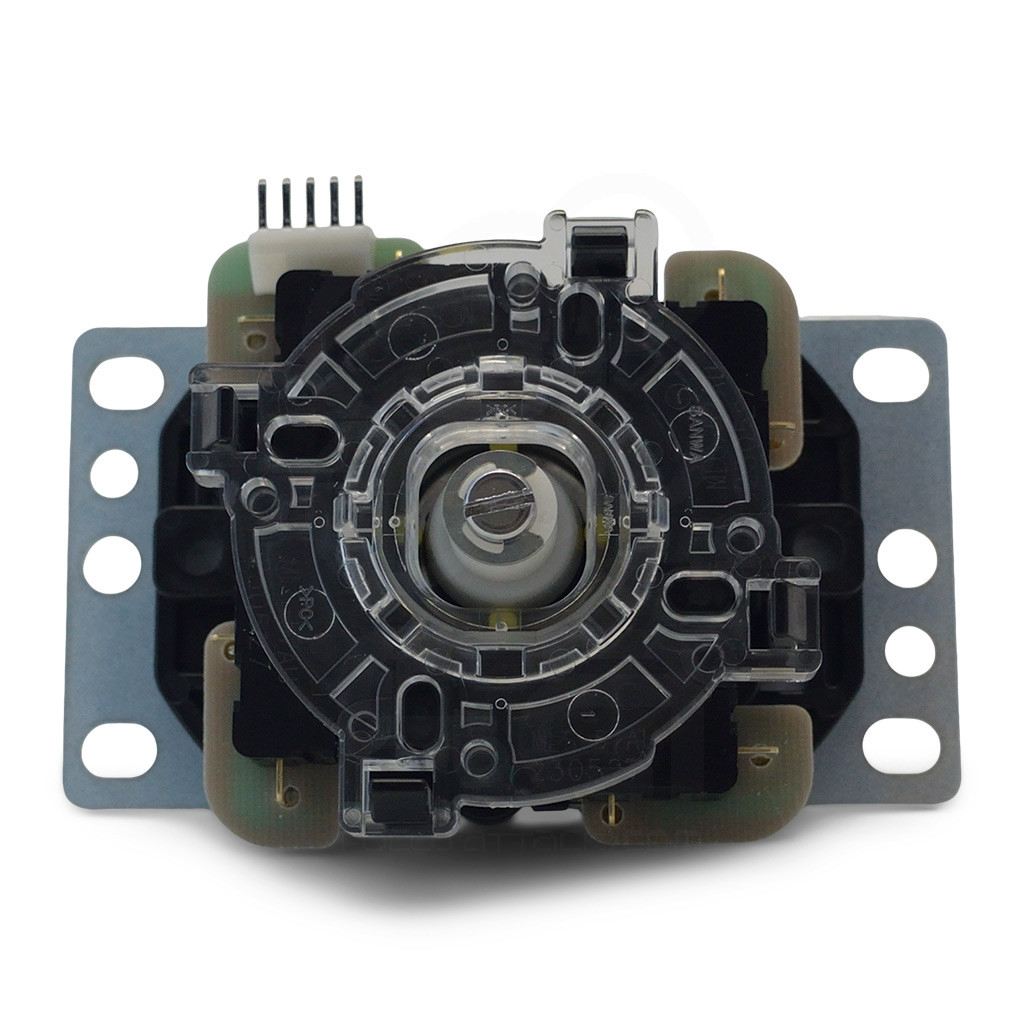

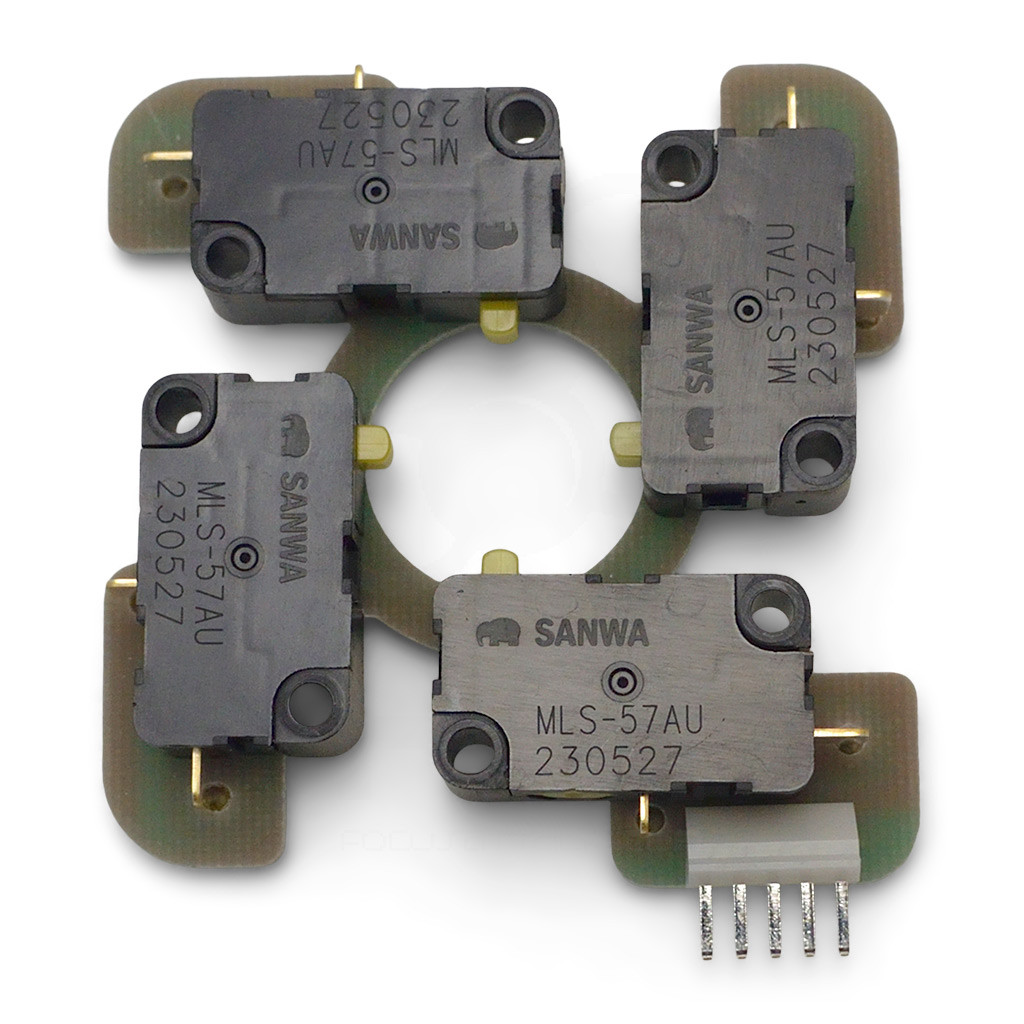
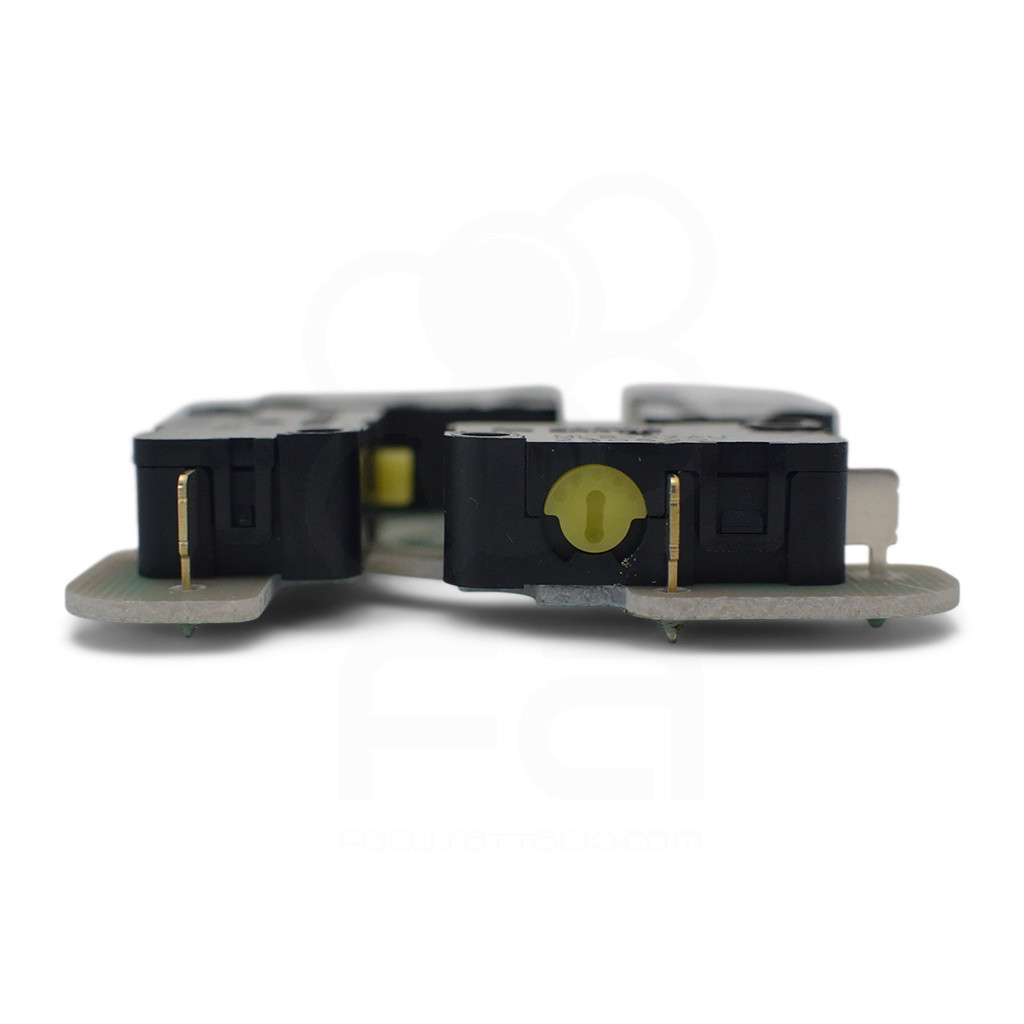
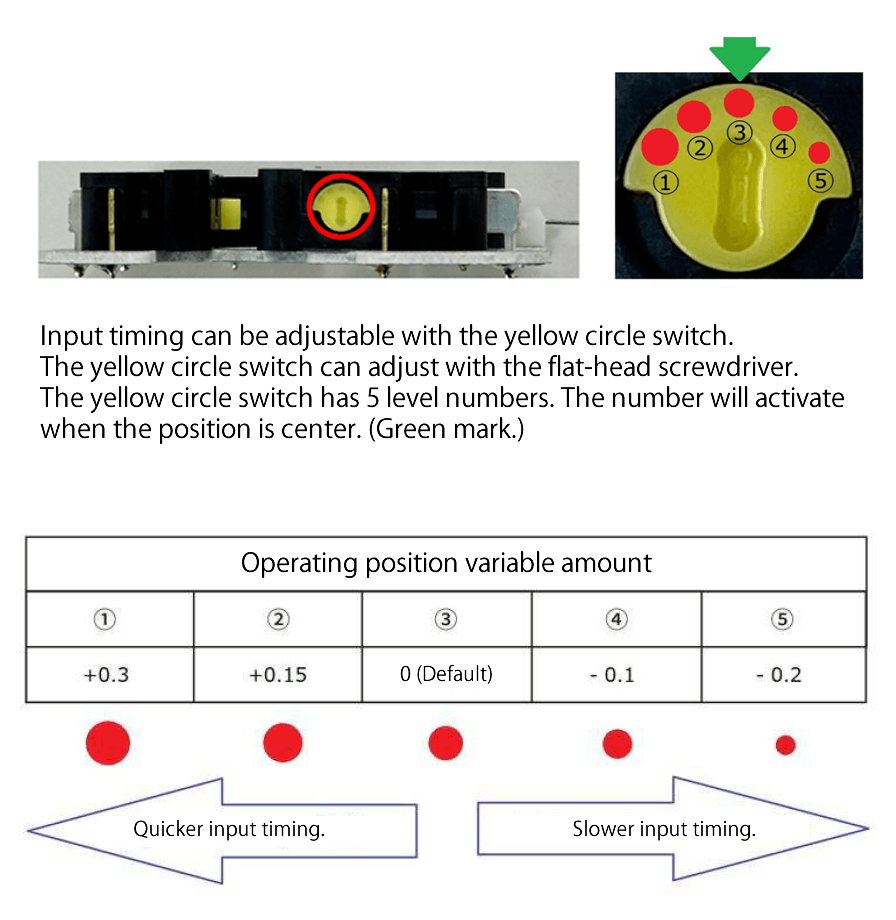
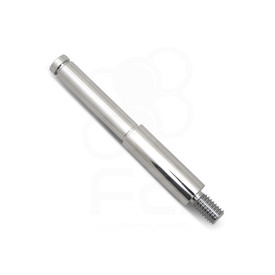
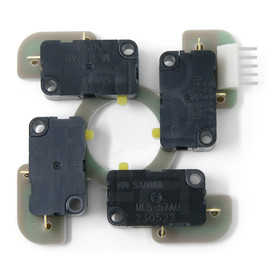
![Sanwa JLX2-TP-8YT Joystick [Successor to Sanwa JLX]](https://cdn2.bigcommerce.com/server500/d90a4/products/3661/images/26805/SANWA-JLX2-TP-8YT-FRONT-EDIT__06325.1749917216.275.275.jpg?c=2)
![Sanwa JLF-TP-8YT Joystick [Precursor to JLX-TP-8YT]](https://cdn2.bigcommerce.com/server500/d90a4/products/385/images/14089/SANWA-JLFTP8YT-JOYSTICK__56301.1707187195.275.275.jpg?c=2)
